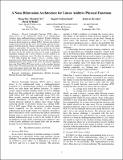A noise bifurcation architecture for linear additive physical functions
Author(s)
Yu, Meng-Day; M’Raihi, David; Verbauwhede, Ingrid; Devadas, Srinivas
DownloadDevadas_A noise.pdf (280.5Kb)
OPEN_ACCESS_POLICY
Open Access Policy
Creative Commons Attribution-Noncommercial-Share Alike
Terms of use
Metadata
Show full item recordAbstract
Physical Unclonable Functions (PUFs) allow a silicon device to be authenticated based on its manufacturing variations using challenge/response evaluations. Popular realizations use linear additive functions as building blocks. Security is scaled up using non-linear mixing (e.g., adding XORs). Because the responses are physically derived and thus noisy, the resulting explosion in noise impacts both the adversary (which is desirable) as well as the verifier (which is undesirable). We present the first architecture for linear additive physical functions where the noise seen by the adversary and the noise seen by the verifier are bifurcated by using a randomized decimation technique and a novel response recovery method at an authentication verification server. We allow the adversary's noise η[subscript a] → 0.50 while keeping the verifier's noise η[subscript v] constant, using a parameter-based authentication modality that does not require explicit challenge/response pair storage at the server. We present supporting data using 28nm FPGA PUF noise results as well as machine learning attack results. We demonstrate that our architecture can also withstand recent side-channel attacks that filter the noise (to clean up training challenge/response labels) prior to machine learning.
Date issued
2014-05Department
Massachusetts Institute of Technology. Department of Electrical Engineering and Computer ScienceJournal
Proceedings of the 2014 IEEE International Symposium on Hardware-Oriented Security and Trust (HOST)
Publisher
Institute of Electrical and Electronics Engineers (IEEE)
Citation
Yu, Meng-Day, David M’Raihi, Ingrid Verbauwhede, and Srinivas Devadas. “A Noise Bifurcation Architecture for Linear Additive Physical Functions.” 2014 IEEE International Symposium on Hardware-Oriented Security and Trust (HOST) (May 2014).
Version: Author's final manuscript
ISBN
978-1-4799-4112-4
978-1-4799-4114-8